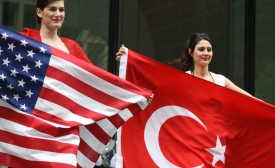vladimir putin
Fake news stories. Doctored photographs. Staged TV clips. Armies of paid trolls. Has Putin’s Russia developed a new kind of information warfare – fought in the ‘psychosphere’ rather than on the battlefield? Or is it all just a giant bluff?
At a joint news conference at the Kremlin, the two leaders said that their discussion had focused on economic issues, including trade and tourism. They also said they talked about energy issues and Russia’s plans to build a natural gas pipeline through Turkey to Europe, in which Greece could play a crucial link.
Russian President Vladimir Putin has been zipping in and out of Central Asia’s capitals, determined not to let the five Stans – Kazakhstan, Kyrgyzstan, Tajikistan, Turkmenistan and Uzbekistan – slide out of Moscow’s orbit. “For Russia, it is about maintaining influence, economic and cultural, and maintaining Central Asia as a security buffer.”
The masked gunmen seen in Crimea, Donetsk and Lugansk came only after the population had been conditioned, through propaganda and other soft power tools, to see Mr. Putin’s Russia as a saviour from the government under which they’d been living.
Obviously, Putin fears European soft power, since it is a force to which he has no response. Russia’s lack of attraction is one of its most serious weak spots. Its leverage rests on its state-controlled extracting industries and its military.

The intersection of public diplomacy, people-to-people communication and international trust building is explored in this new article by Kirsten Mogensen, an associate professor at Roskilde University in Denmark and an alumna of the CPD Summer Institute.
If we really knew what is going on in the Kremlin backrooms, where Russia’s information war is being planned, we in the West would be shocked, writes author Peter Pomerantsev in Politico magazine.







